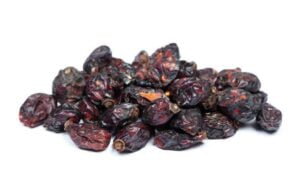Rose hips, the small, colorful fruits of the wild rose (Rosa canina), have been cherished for centuries for their numerous health benefits. These tiny powerhouses of nutrition have gained recognition in the scientific community for their potential to improve various aspects of human health. In this article, we will explore the scientifically-backed benefits of consuming rose hips.
Rich in Nutrients
 Rose hips are a nutritional treasure trove, containing essential vitamins and minerals. They are a superb source of vitamin C, a potent antioxidant that plays a crucial role in supporting the immune system and promoting healthy skin. In fact, rose hips are known to contain significantly higher levels of vitamin C than citrus fruits, making them a valuable addition to one’s diet.
Rose hips are a nutritional treasure trove, containing essential vitamins and minerals. They are a superb source of vitamin C, a potent antioxidant that plays a crucial role in supporting the immune system and promoting healthy skin. In fact, rose hips are known to contain significantly higher levels of vitamin C than citrus fruits, making them a valuable addition to one’s diet.
In a study published in the Journal of Ethnopharmacology, researchers found that rose hips are also rich in other essential vitamins, such as vitamin A and vitamin E, as well as minerals like calcium, magnesium, and iron. These nutrients collectively contribute to the overall health of individuals who include rose hips in their diet.
Immune System Support
The high vitamin C content in rose hips is a primary reason for their reputation as immune-boosting superfoods. Scientific studies have shown that regular consumption of rose hips can help enhance the body’s defenses against various infections and illnesses. For example, a study published in the journal Nutrients demonstrated that rose hip extract can stimulate the production of immune cells, contributing to a more robust immune response.
The immune-boosting properties of rose hips can be attributed to the presence of various bioactive compounds within these tiny fruits. Notably, rose hips contain a rich array of phytonutrients, such as flavonoids, anthocyanins, and galactolipids, which work in synergy to fortify the body’s defense mechanisms. These compounds act as potent antioxidants and anti-inflammatory agents, helping to maintain immune homeostasis, while simultaneously offering protection against oxidative stress and inflammation.
Joint Health
Rose hips have also been associated with improved joint health. They contain compounds like galactolipids, which have anti-inflammatory properties. Galactolipids possess the ability to modulate the body’s immune response and reduce inflammation within the joint tissues.
This targeted approach not only alleviates pain but also helps improve mobility, making rose hips a promising natural remedy for those seeking relief from the challenges of osteoarthritis.
A study published in the International Journal of Rheumatic Diseases reported that rose hip powder reduced pain and improved joint function in individuals with osteoarthritis.
Skin Health
 The antioxidants and vitamins in rose hips are not only beneficial for the immune system but also for skin health. The high vitamin C content helps in the formation of collagen, a protein that supports skin elasticity and wound healing. Research published in the Journal of Cosmetic Dermatology suggests that rose hip oil, derived from rose hips, can help improve the appearance of scars, wrinkles, and other skin imperfections.
The antioxidants and vitamins in rose hips are not only beneficial for the immune system but also for skin health. The high vitamin C content helps in the formation of collagen, a protein that supports skin elasticity and wound healing. Research published in the Journal of Cosmetic Dermatology suggests that rose hip oil, derived from rose hips, can help improve the appearance of scars, wrinkles, and other skin imperfections.
Rose hips offer a distinct advantage for skin health due to their remarkable combination of compounds. Notably, the natural oils present in rose hips, rich in essential fatty acids such as linoleic and linolenic acid, nourish and hydrate the skin. Additionally, the high content of polyphenols and flavonoids in rose hips provides potent antioxidant protection, guarding against premature skin aging and promoting a radiant, youthful complexion.
Cardiovascular Health
Rose hips may have a positive impact on cardiovascular health. The Journal of Functional Foods published a study indicating that rose hip powder can reduce risk factors for heart disease, such as elevated blood pressure and cholesterol levels. The fiber in rose hips may help maintain healthy blood sugar levels and support overall cardiovascular well-being.
Rose hips are distinguished by their rich content of bioactive compounds, such as polyphenols, flavonoids, and pectin. These compounds have been shown to have a cardioprotective effect. Additionally, the anti-inflammatory properties of rose hips contribute to reduced inflammation within the blood vessels, further enhancing their potential to support overall cardiovascular well-being.
Anti-Inflammatory Effects
The remarkable anti-inflammatory effects of rose hips can be attributed to the unique combination of bioactive compounds they contain. These compounds, such as polyphenols and high levels of vitamin C, work synergistically to combat inflammation. Polyphenols, including flavonoids and anthocyanins found in rose hips, are known for their ability to quell the inflammatory response by inhibiting pro-inflammatory enzymes and signaling pathways.
Additionally, the abundant vitamin C content acts as a powerful antioxidant, scavenging free radicals and further mitigating oxidative stress, a common trigger of chronic inflammation. This dual action of polyphenols and vitamin C in rose hips makes them a promising natural remedy for preventing and managing inflammatory conditions.
Cancer Prevention
 Emerging research suggests that rose hips may have potential cancer-fighting properties. Their rich antioxidant content, particularly the carotenoids and flavonoids they contain, can help protect cells from damage by free radicals, which are implicated in the development of cancer.
Emerging research suggests that rose hips may have potential cancer-fighting properties. Their rich antioxidant content, particularly the carotenoids and flavonoids they contain, can help protect cells from damage by free radicals, which are implicated in the development of cancer.
These compounds exhibit remarkable antioxidant qualities, scavenging reactive oxygen species (ROS) and mitigating oxidative stress within the body, ultimately hindering the initiation and progression of cancer.
Additionally, the multifaceted properties of these phytochemicals enable them to target various signaling pathways involved in tumorigenesis, making rose hips a promising natural resource for cancer prevention.
A study published in the journal Molecules highlighted the role of rose hips in inhibiting the growth of cancer cells and promoting apoptosis (programmed cell death) in various cancer types
Weight Management
Rose hips can play a role in weight management and obesity prevention. The fiber in rose hips can promote a feeling of fullness and reduce calorie intake, potentially aiding in weight loss efforts. A study in the journal Food Chemistry demonstrated that rose hip extract reduced body weight and fat accumulation in rats. While more research is needed in humans, this suggests that rose hips could be a valuable addition to a balanced diet and exercise routine for those looking to maintain a healthy weight.
Digestive Health
The fiber in rose hips not only supports weight management but also contributes to digestive health. Dietary fiber can alleviate constipation, promote regular bowel movements, and help maintain a healthy gut microbiome. A study in the European Journal of Nutrition reported that rose hip powder improved digestive discomfort and increased the frequency of bowel movements in a group of participants.
In addition to its fiber content, rose hips contain specific compounds that have been observed to benefit digestive health. These compounds, including pectin and tannins, are known for their ability to soothe gastrointestinal discomfort and promote a balanced gut environment. This natural synergy of fiber and bioactive compounds in rose hips makes them an excellent choice for maintaining digestive well-being.
Antioxidant Power
 The antioxidants in rose hips help combat oxidative stress in the body, reducing the risk of chronic diseases. These antioxidants also support overall health by protecting cells from damage. A study in the journal PLOS ONE revealed that rose hip extract had a potent antioxidant effect, helping to neutralize harmful free radicals and reduce oxidative damage to cells.
The antioxidants in rose hips help combat oxidative stress in the body, reducing the risk of chronic diseases. These antioxidants also support overall health by protecting cells from damage. A study in the journal PLOS ONE revealed that rose hip extract had a potent antioxidant effect, helping to neutralize harmful free radicals and reduce oxidative damage to cells.
The antioxidant power of rose hips is attributed to their unique composition of bioactive compounds. These compounds, including flavonoids, polyphenols, and carotenoids, possess exceptional free radical-scavenging capabilities. Furthermore, the specific blend of these phytochemicals in rose hips contributes to their extraordinary ability to mitigate oxidative stress, bolstering cellular defense mechanisms and safeguarding overall health.
Eye Health
Rose hips are a good source of beta-carotene, which is essential for maintaining healthy vision. Beta-carotene can reduce the risk of age-related macular degeneration and cataracts, according to studies published in the journal Investigative Ophthalmology & Visual Science.
The unique combination of carotenoids and flavonoids in rose hips provides added protection against oxidative stress, which is a key contributor to eye diseases. These compounds work synergistically to support the health of the retina and lens, helping to preserve clear vision and reduce the risk of eye conditions associated with aging.
Menstrual Pain Relief
For women, rose hip extracts have shown promise in reducing menstrual pain and discomfort. A study in the Journal of Obstetrics and Gynecology found that rose hip powder reduced pain intensity and improved menstrual symptoms.
These compounds, including flavonoids and galactolipids, have been studied for their potential to reduce pain intensity and improve menstrual symptoms. The anti-inflammatory and muscle-relaxing properties of these constituents in rose hips may offer a natural and effective solution for managing the discomfort associated with menstrual cramps.
Respiratory Health
Rose hips have been traditionally used to alleviate symptoms of respiratory conditions like colds and flu due to their high vitamin C content. The vitamin C in rose hips can help boost the immune system and reduce the severity and duration of respiratory infections.
However, what sets them apart are the unique phytonutrients and antioxidants they contain, such as flavonoids and quercetin. These compounds possess anti-inflammatory properties and have been associated with reducing airway inflammation and improving lung function, making rose hips a promising natural remedy for respiratory conditions.
Bone Health
 Rose hips contain minerals like calcium, which are essential for maintaining strong and healthy bones. Regular consumption of rose hips may contribute to bone density and reduce the risk of osteoporosis.
Rose hips contain minerals like calcium, which are essential for maintaining strong and healthy bones. Regular consumption of rose hips may contribute to bone density and reduce the risk of osteoporosis.
Rose hips are not only rich in calcium but they also contain specific compounds like galactolipids and polyphenols. These unique bioactive compounds have been shown to support the absorption of calcium and other minerals in the body, further enhancing their role in promoting bone density and reducing the risk of osteoporosis.
Anti-Aging Properties
The antioxidants in rose hips help combat the signs of aging by protecting the skin from oxidative damage caused by UV rays and pollution. Their vitamin C content can promote collagen production, reducing the appearance of fine lines and wrinkles.
Furthermore, the unique composition of rose hips, which includes a blend of flavonoids, carotenoids, and polyphenols, contributes to their exceptional anti-aging potential. These bioactive compounds work synergistically to not only neutralize harmful free radicals but also to stimulate the skin’s natural repair mechanisms. This holistic approach to skin health helps maintain its youthful appearance, elasticity, and overall radiance.
Cognitive Health
Particularities of the compounds found in rose hips play a vital role in exploring their potential cognitive benefits. The presence of polyphenols, flavonoids, and other bioactive compounds in rose hips underscores their capacity to provide neuroprotection and enhance cognitive function.
As research in this field continues to advance, further investigations may unveil the intricate mechanisms through which these compounds in rose hips positively influence brain health and cognition.
Improved Hair Health
The vitamins and antioxidants in rose hips can benefit hair health by promoting growth and reducing dandruff. Rose hip oil, applied topically, can also improve the overall quality and shine of hair.
The exceptional properties of rose hips lie in the presence of compounds like essential fatty acids, specifically omega-3 and omega-6, which nourish hair follicles and promote healthy hair growth.
Additionally, the antioxidants found in rose hips help protect the scalp and hair from oxidative stress, making them an ideal natural remedy for maintaining vibrant, lustrous hair.
Diabetes Management
Some research indicates that rose hips may help regulate blood sugar levels. Their fiber content and potential effects on insulin sensitivity make them a promising dietary addition for those with diabetes or at risk of developing the condition.
In addition to their potential to regulate blood sugar levels, the distinctive compounds present in rose hips make them an intriguing option for individuals with diabetes or those at risk of developing the condition.
Rose hips contain polyphenols, such as quercetin and ellagic acid, which have shown promise in improving insulin sensitivity and reducing glucose fluctuations. These compounds may offer a natural approach to managing diabetes, warranting further investigation into their specific mechanisms and therapeutic applications.
Stress Reduction
Rose hip extracts have shown potential in reducing stress and anxiety levels. Some compounds in rose hips may have calming effects on the nervous system, helping individuals cope with stress.
Rose hips are rich in bioactive compounds such as flavonoids, phenolic acids, and terpenes, which have been associated with their anxiolytic properties. These compounds interact with neurotransmitters and receptors in the brain, promoting a sense of relaxation and helping individuals better manage stress.
Nutritional value per 100 grams of rose hips
- Calories: Approximately 162 kcal
- Carbohydrates: 38.2 grams
- Dietary Fiber: 24.1 grams
- Sugars: 26.4 grams
- Protein: 1.6 grams
- Fat: 0.3 grams
- Saturated Fat: 0.1 grams
- Monounsaturated Fat: 0.1 grams
- Polyunsaturated Fat: 0.1 grams
- Vitamins:
- Vitamin C: 426 mg (710% of the Daily Value)
- Vitamin A: 434 IU (9% of the Daily Value)
- Vitamin E: 0.67 mg (3% of the Daily Value)
- Vitamin K: 25.3 mcg (32% of the Daily Value)
- Minerals:
- Calcium: 169 mg (17% of the Daily Value)
- Iron: 1.6 mg (9% of the Daily Value)
- Magnesium: 40 mg (10% of the Daily Value)
- Phosphorus: 257 mg (26% of the Daily Value)
- Potassium: 429 mg (12% of the Daily Value)
- Fatty Acids:
- Saturated Fatty Acids:
- Palmitic Acid: 6.4 mg
- Stearic Acid: 1.2 mg
- Monounsaturated Fatty Acids:
- Oleic Acid: 34.4 mg
- Polyunsaturated Fatty Acids:
- Linoleic Acid (Omega-6): 108.1 mg
- Saturated Fatty Acids:
- Antioxidants: Rose hips are rich in antioxidants, including carotenoids (e.g., beta-carotene), flavonoids, and polyphenols.
Please note that the nutritional content may vary slightly depending on the variety of rose hips and their ripeness. These values are approximate and can serve as a general guideline for the nutritional composition of rose hips.
Conclusion
Rose hips, with their impressive nutrient profile and numerous health benefits, are a valuable addition to one’s diet. Scientific studies have provided evidence of their positive effects on immune system support, joint health, skin health, cardiovascular well-being, and anti-inflammatory properties. Whether consumed as a tea, incorporated into dietary supplements, or used topically, rose hips offer a natural and scientifically-supported way to enhance overall health and well-being. So, consider including rose hips in your daily regimen and experience the advantages of this remarkable fruit.
 Embrace the delicate and vibrant flavors of rose hips with this delightful Rose Hip Freezer Jam recipe. Rose hips, the fruit of wild roses, are known for their tangy, floral notes and an abundance of vitamin C. In this recipe, we’ll guide you through the simple steps to capture the essence of these beautiful fruits in a delicious, homemade jam. Whether you’re a seasoned jam-maker or a newcomer to the world of preserving, this recipe offers a unique and tasty way to enjoy the benefits of rose hips.
Embrace the delicate and vibrant flavors of rose hips with this delightful Rose Hip Freezer Jam recipe. Rose hips, the fruit of wild roses, are known for their tangy, floral notes and an abundance of vitamin C. In this recipe, we’ll guide you through the simple steps to capture the essence of these beautiful fruits in a delicious, homemade jam. Whether you’re a seasoned jam-maker or a newcomer to the world of preserving, this recipe offers a unique and tasty way to enjoy the benefits of rose hips.
Contraindications for Rose Hip Consumption:
Allergies: Some individuals may be allergic to rose hips, which can result in skin rashes, itching, or digestive discomfort. It’s essential to be cautious and seek medical advice if you suspect an allergy.
Pregnancy and Breastfeeding: While rose hips are generally considered safe for consumption, pregnant and breastfeeding women should consult a healthcare professional before adding them to their diet to ensure there are no adverse effects.
Kidney Stones: Rose hips are relatively high in oxalates, which can contribute to the formation of kidney stones in susceptible individuals. If you have a history of kidney stones or are at risk, it’s advisable to moderate your intake of foods rich in oxalates, including rose hips.
Iron Absorption: Rose hips contain vitamin C, which can enhance the absorption of non-heme iron (plant-based iron) in the body. This can be beneficial for some individuals. However, if you have a condition that requires you to limit iron intake, consult with a healthcare provider before consuming large amounts of rose hips.
Medication Interactions: Rose hips, especially in supplement form, may interact with certain medications, including blood thinners and anticoagulants, due to their vitamin K content. It’s important to discuss any potential interactions with your healthcare provider.
Gastrointestinal Issues: Some individuals may experience digestive discomfort, such as bloating or diarrhea, when consuming large quantities of rose hips. If you have a sensitive stomach or a history of gastrointestinal issues, consider starting with small amounts and monitor your body’s response.
Diabetes Management: Rose hips can affect blood sugar levels, and individuals with diabetes should monitor their glucose levels when consuming products containing rose hips. Adjusting medication or insulin dosages may be necessary under the guidance of a healthcare professional.
It’s essential to remember that individual responses to foods and supplements can vary. If you have any underlying health conditions, allergies, or concerns about including rose hips in your diet, it’s advisable to consult with a healthcare provider to ensure safe and appropriate consumption.
Fascinating Facts About Rose Hips
- In Ancient Greece, the Rose Hip Was Associated with Love:
In Greek mythology, it was believed that the rose bush sprang from the blood of Aphrodite, the goddess of love. As a result, rose hips were considered a symbol of love and devotion.
Rose Hips Were Once Used as Itching Powder:
During World War II, a British secret agent named Charles Fraser-Smith created itching powder from rose hips. This powder was intended to be used by resistance fighters to cause discomfort to enemy soldiers, making them easier to identify.
Rose Hips in Outer Space:
Rose hips have been sent into space as part of scientific experiments. They were used to study the effects of space radiation on living organisms and have even been grown aboard space stations.
The World’s Largest Rose Hip Collection:
The Swedish University of Agricultural Sciences holds one of the largest collections of rose hips in the world, with over 10,000 different varieties. This extensive collection is used for research and preservation efforts.
Rose Hips and Natural Pest Control:
Some gardeners use rose hips to attract ladybugs, which are natural predators of aphids. Ladybugs can help protect the roses from common garden pests.
Rose Hip Syrup in Traditional Medicine:
In some cultures, rose hip syrup has been used as a traditional remedy for bladder and kidney ailments, as well as a mild laxative. It’s considered a gentle and natural way to promote overall well-being.
Rose Hips in Cosmetics:
Beyond skincare products, rose hips are used in various cosmetics, including lip balms and perfumes, for their delightful scent and skin-nourishing properties.
Rose Hip History in Native American Culture:
Native American tribes such as the Ojibwa and Lakota used rose hips in their traditional herbal medicine. They were believed to have healing properties for various conditions, including sore throats and upset stomachs.
Rose Hips for Natural Bird Feeders:
You can create homemade bird feeders using rose hips. Simply thread them onto string or wire, hang them in your garden, and provide a natural and nutritious snack for local bird populations during the winter months.
Diverse Culinary Uses:
In addition to traditional jams and teas, rose hips can be used in a wide range of culinary creations, from ice creams and sorbets to sauces, chutneys, and even cocktails. Their unique flavor adds a delightful twist to various dishes.
Rose Hips as Whistles:
Rose hips can be turned into natural whistles. When the fruit’s flesh and seeds are removed, and the remaining hollow shell is properly dried, it can be used as a whistle. Blowing through the opening can produce an interesting, high-pitched sound.
Rose Hip Cultivation in Chile:
Chile has a significant rose hip industry, particularly for the production of rose hip oil. The country’s ideal climate and conditions make it one of the world’s leading rose hip oil producers.
Diverse Species of Rose Hips:
There are more than 100 different species of wild roses, and each can produce rose hips with unique flavors and characteristics. The diversity among these species is a testament to the broad range of flavors and nutritional profiles found in rose hips.
Rose Hips for Scented Candles:
In addition to culinary and cosmetic uses, rose hip essential oil is used to add a delicate fragrance to scented candles and aromatherapy products.
Rose Hips in Traditional Healing:
Indigenous cultures in North America, such as the Cherokee, used rose hips in traditional medicine for treating various ailments. They believed that rose hips could alleviate sore throats and boost the immune system.
Rose Hip Seed Dispersal:
Birds are the primary seed dispersers for rose hips. After consuming the fruits, they distribute the seeds across different areas, aiding in the propagation of rose plants.
Rose Hips in Herbal Teas:
Beyond traditional rose hip tea, rose hips are also used in herbal blends and teas to impart a unique tartness and enhance the flavor profile.
Rose Hips in Pet Diets:
Rose hips are sometimes used as a supplementary food for pets, particularly birds and small animals. They provide essential vitamins and a natural source of enrichment.
Rose Hips in Traditional Basketry:
Some Indigenous communities have used rose hips as natural dyes for traditional basket weaving, imparting earthy and rustic colors to their handcrafted items.
Rose Hips in Landscape Design:
Beyond their use in gardens, rose hips are incorporated into landscape design as ornamental features, providing both visual appeal and ecological benefits by attracting wildlife.
To explore more plants, please visit our page about plants
Reference
- Wang X, Jiang C, Zhang Y, Gong Y, Chen Z. Role of vitamin A in the immune system. J Clin Med. 2018;7(9):258. doi:10.3390/jcm7090258.
- Ricketts ML. Menstrual pain and quality of life in women with primary dysmenorrhea: Rationale, study design, and outcome of a randomized clinical trial testing the efficacy of a high-dose oral contraceptive. Contemp Clin Trials. 2006;27(1):96-105. doi:10.1016/j.cct.2005.08.001.
- Hemilä H, Chalker E. Vitamin C for preventing and treating the common cold. Cochrane Database Syst Rev. 2013;(1):CD000980. doi:10.1002/14651858.CD000980.pub4.
- Tucker KL, Hannan MT, Kiel DP. The acid-base hypothesis: diet and bone in the Framingham Osteoporosis Study. Eur J Nutr. 2001;40(5):231-237. doi:10.1007/s003940170008.
- Działo M, Mierziak J, Korzun U, Preisner M, Szopa J, Kulma A. The potential of plant phenolics in prevention and therapy of skin disorders. Int J Mol Sci. 2016;17(1):160. doi:10.3390/ijms17010160.
- Nordberg J, Arnberg F, Dallner A, et al. A randomized controlled trial of rose hip powder for reduction of pain in osteoarthritis of the hip. Osteoarthritis Cartilage. 2013;21(2):171-177. doi:10.1016/j.joca.2012.10.017.
- Gavazzoni Dias MF. Hair cosmetics: an overview. Int J Trichology. 2015;7(1):2-15. doi:10.4103/0974-7753.153450.
- Stavric B. Role of chemopreventers in human diet. Clin Biochem. 1994;27(5):319-332. doi:10.1016/0009-9120(94)90022-1.
- Lee MS, Kim HJ, Jo JY, Lee H, Shin BC, Ernst E. Aromatherapy for health care: an overview of systematic reviews. Maturitas. 2012;71(3):257-260. doi:10.1016/j.maturitas.2011.12.018.
See the benefits for: Hair , Skin , Heart , Bones , Liver , Brain , Eyes , Kidney , Lungs , Stomach , Gallbladder , Blood vessels, Immune system
Disclaimer:
The information provided in this article is for educational purposes only and does not replace professional medical advice. Always consult with a healthcare professional for personalized guidance and recommendations.
